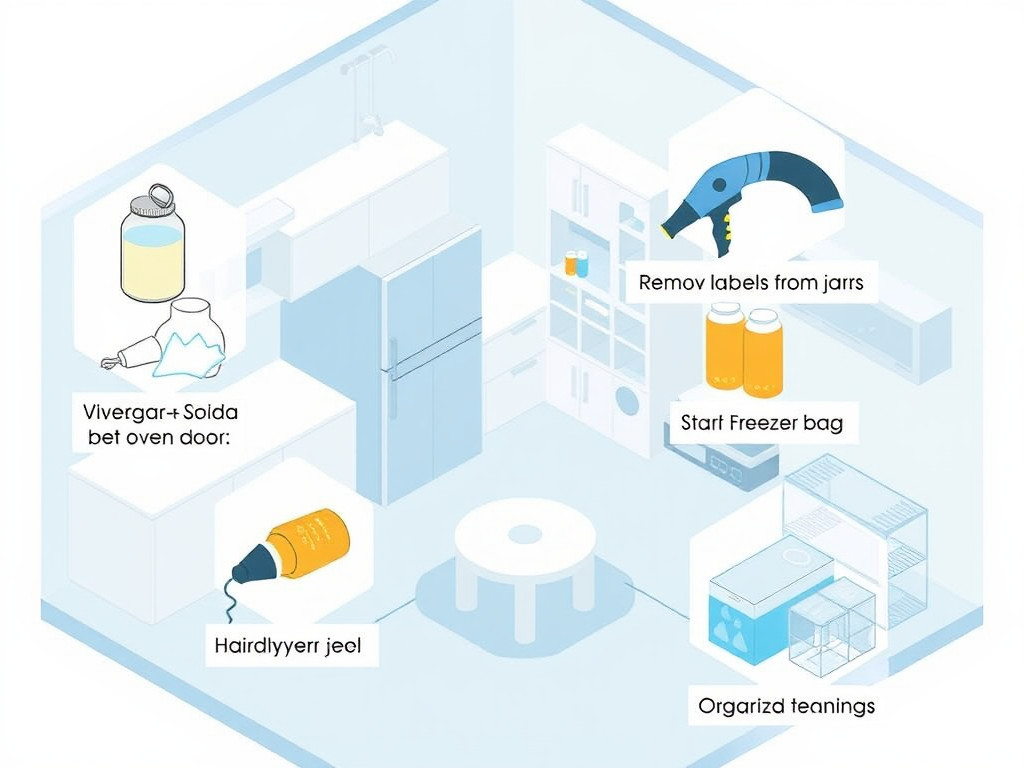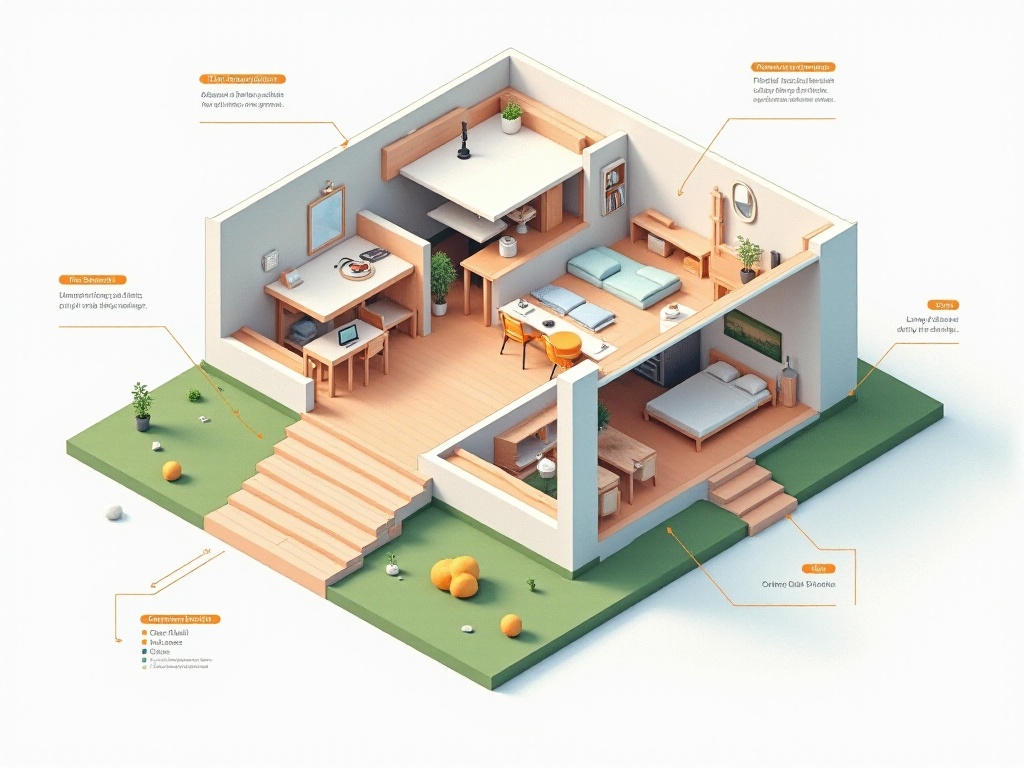
Introduction
Hello everyone! I recently moved from a shared apartment into my own small nest, and organizing during the move really wore me out! However, during this process, I discovered some particularly useful organization tips that I'd like to share with you today. Are you also often troubled by problems like having too many items and not being able to find things? Take a look at this article - I guarantee you'll find solutions after reading it!
Organization Philosophy
When it comes to organization, I was also a complete novice at first. When I first moved, I went crazy buying storage boxes online, thinking the more the better. The result? The storage boxes I bought were piled up everywhere, becoming new clutter themselves. Later I realized that organization isn't simply stuffing things into boxes, but establishing a system.
I remember when I first started organizing the living room, just looking at that pile of stuff gave me a headache. Clothes, books, cosmetics, stationery, all kinds of things mixed together, it was absolutely overwhelming. It took me three whole days to get the living room looking decent. This process taught me a lesson: the most important thing about organization isn't how many tools you buy, but finding a dedicated place for everything.
Just like how each of us has our own home, items also need their own "home". For example, in my house, the remote control must be in the right drawer of the TV cabinet; skincare products must be arranged in order of use on the dressing table; frequently used stationery goes in the most convenient drawer of the desk. This way, I no longer have to search the whole house for things because I know where everything is.
Kitchen Tips
If we're talking about the most headache-inducing organization area, the kitchen definitely ranks first! My kitchen isn't very big, but after some organizing, I can now easily find everything.
Let's start with refrigerator organization. I bought a rotating tray on Taobao for 48 yuan, and it's truly a magical tool! Previously, food ingredients would often get pushed to corners in the fridge and be forgotten until they went moldy, but since using this tray, a gentle spin lets me see everything. It's especially useful for condiments - no more worrying about not being able to reach the soy sauce bottle hidden in the back.
Speaking of ingredient storage, I have a clever trick for storing cheese. I used to wrap cheese in plastic wrap, but it would either dry out or get moldy. Later, I learned from a food blogger that wrapping cheese in wax paper works particularly well. Wax paper maintains the cheese's moisture while letting it breathe, so the cheese neither dries out nor gets moldy. Now the cheese in my house keeps particularly well, and I don't have to worry about waste anymore.
Besides these, I've also divided my fridge into zones. The top shelf is for leftovers that need to be eaten quickly, the middle shelf for fresh fruits and vegetables, and the bottom shelf for ingredients that need long-term storage. The freezer is organized the same way, with foods arranged by expiration date. I've labeled each zone so everyone in the family knows where things should go.
Kitchen counter organization is also important. I categorize condiments by frequency of use: the most frequently used ones go on the spice rack next to the stove, while less frequently used ones go in the cabinet. I arrange knives by size, with the everyday chopping knife on the outside and fruit knives on the inside. This makes cooking very convenient - no more rummaging around for tools!
Cable Management
The most frustrating thing for modern people might be all those charging cables! Phone chargers, tablet chargers, laptop power cords, earphone cables - they add up to dozens. Previously, I would just stuff all my charging cables into a drawer, and finding one meant turning the entire drawer upside down.
Later, I discovered a super useful method: using bread bag clips to organize and label cables. These little clips are readily available, no need to buy anything. I use a marker to write labels on the clips, like "iPhone charger", "Xiaomi tablet", "Switch charger", and so on. This way, I can spot the charger I need at a glance.
Not only that, but I also use these clips to roll up and secure the cables. This prevents them from tangling together and getting damaged from repeated folding. Oh, and remember to store away the cables you don't use often, keeping only frequently used ones within reach. Now I only keep my phone and tablet chargers by my bedside, while the others are stored in my study's drawer.
The network cables and power cords at home were also a big problem. Behind my TV cabinet used to be like a spider web, with all sorts of cables tangled together. Later, I used cable organizers to bundle the cables by category and labeled each cable's purpose with stickers. Now even when I need to change a device, I can immediately identify which cable to unplug.
Time Management
Organization isn't just about arranging items; time management is also important. I now spend 10 minutes every night preparing things I'll need the next day. Getting clothes, bags, and keys ready means no more rushing around in the morning.
I especially want to mention my alarm clock placement method. I put my alarm clock about two meters away from my bed, so I have to get up and walk over to turn it off. Although this method was painful at first, it's really effective. Plus, I've found that once you actually get up and move around, it's very hard to go back to bed and be lazy.
I've also made a rule for myself: the first thing to do after getting home is organize my bag. Throw away unnecessary receipts and flyers, put things that are needed back in their place. This way, I won't be carrying around a bunch of trash the next day. On weekends, I empty everything out of my bag for a thorough cleaning.
Creative Storage
Sometimes, ordinary things in life can become excellent storage tools. For example, I can't bear to throw away empty peanut butter jars. These glass jars, once cleaned, can be used to store various small items. I now use them to store hair ties, paper clips, thumbtacks, and other easily lost small things.
Something special worth mentioning is that when the peanut butter is almost gone, I pour in some milk and shake it. This not only uses up all the remaining peanut butter but also makes a delicious peanut milkshake. I was absolutely thrilled when I discovered this trick - it's both environmentally friendly and delicious!
Old shoe boxes are also great storage tools. I wrap shoe boxes in pretty wrapping paper and place them at the bottom of my wardrobe to store seasonal clothes. Shoe boxes are just the right size and stack neatly. I also put labels on each box indicating which season's clothes are inside.
Key Management
Keys are truly a love-hate relationship. House keys, office keys, garage keys - there's a whole bunch hanging on the key ring, and every time I need to open a door, I have to try several times. I came up with a super practical solution: marking keys with nail polish.
I painted my house key red, office key blue, and garage key yellow. Now I know which key to use just by looking at the color. Plus, nail polish is cheap and durable, so there's no worry about the color wearing off. I also attached a small charm to my key ring, making it easy to find the keys by touch when searching in my bag.
To prevent losing keys, I installed a key hook at home. It's on the wall by the entrance, and the first thing I do when I get home is hang up my keys. This way, keys don't get misplaced and can't get lost. I also put a small tray next to the key hook for loose change and transit cards.
Speaker Hack
I discovered this trick by accident while hosting a party at my home. That day, friends came over to play, and we wanted to play some music, but the phone volume wasn't loud enough. Just when we were wondering what to do, I had a sudden idea and put the phone in a ceramic bowl.
Surprisingly, the volume immediately increased! And the sound became very three-dimensional, like having surround sound. Later, I used this trick while camping too, putting my phone in a stainless steel lunch box, and it worked great. This is much more economical than buying a portable speaker!
I also discovered that containers of different materials produce different sound effects. Ceramic bowls produce the brightest sound, glass cups produce a more transparent sound, and wooden bowls produce a warmer sound. Now I always keep containers of different materials ready at home and choose different "speakers" for different occasions.
Phone Usage
Speaking of phones, I want to share a particularly useful typing trick. Many people might not know that phones can be set up with text shortcuts. For example, I often need to send "I'll reply later," so I set it up as a shortcut phrase. Just typing "hlh" automatically expands into the complete sentence.
I've set up many other shortcuts too. For example, "zj" represents "I'm on the way, almost there," and "xm" represents "I'm off work, on my way home." This not only makes typing much faster but also prevents typos when rushing to reply.
Besides text shortcuts, I also make good use of my phone's notes function. Whenever I think of something, I immediately write it in my notes. I set different tags for different items, such as "To Do," "Shopping List," "Ideas," etc. This way, I can quickly find relevant content when needed.
Experience Summary
After sharing so many organization tips, the most important thing is still persistence. I suggest everyone start gradually, beginning with the simplest things. For example, start by organizing one drawer, then move on to the next one once you're used to it. Don't try to organize everything at once - that's an easy way to give up.
I started with organizing my bedside table. First, remove things that aren't needed, then categorize what's left. Once the bedside table was organized, I found myself wanting to organize other places too. Going bit by bit like this, now basically every corner of my home is in good order.
Remember, the purpose of organization isn't to hide things away, but to be able to find everything immediately when needed. As I often say: organization isn't the goal; making life easier is. Good organization habits can save us a lot of time looking for things, allowing us to focus more energy on what's really important.
Final Words
These are all methods I've practiced in daily life, and they really can make life more orderly. Of course, everyone has different living habits and home layouts, so you can adjust these methods according to your actual situation.
If you also have any useful organization tips, feel free to tell me in the comments. Let's share and improve together, making our homes more neat and beautiful. After all, a tidy home can give us a relaxed and happy living space, right?
Next
Is Drinking More Water Also a Skill? 8 Practical Tips to Make Drinking Water Super Easy
A comprehensive guide covering healthy lifestyle management and practical life tips, including balanced diet principles, nutritional supplements, weight management, exercise plans, kitchen skills and home organization methods
10 Super Practical Home Organization Tips to Keep Your Home in Perfect Order
Discover practical life hacks covering home organization, daily productivity enhancement, and electronic device usage tips to create a more efficient and comfortable lifestyle
A Surprising Truth About Nutrition: Is Healthy Eating Really That Hard?
Discover essential nutrition and diet tips, including balanced eating habits, nutritional supplements, weight management, and hydration, along with practical kitchen and household cleaning techniques
Next

Is Drinking More Water Also a Skill? 8 Practical Tips to Make Drinking Water Super Easy
A comprehensive guide covering healthy lifestyle management and practical life tips, including balanced diet principles, nutritional supplements, weight management, exercise plans, kitchen skills and home organization methods

10 Super Practical Home Organization Tips to Keep Your Home in Perfect Order
Discover practical life hacks covering home organization, daily productivity enhancement, and electronic device usage tips to create a more efficient and comfortable lifestyle

A Surprising Truth About Nutrition: Is Healthy Eating Really That Hard?
Discover essential nutrition and diet tips, including balanced eating habits, nutritional supplements, weight management, and hydration, along with practical kitchen and household cleaning techniques


